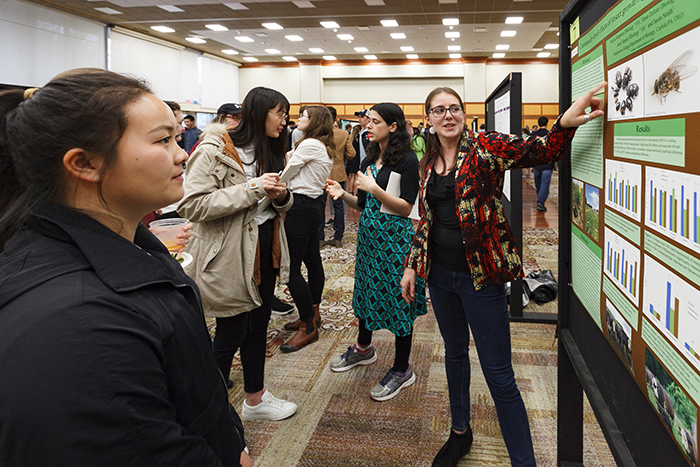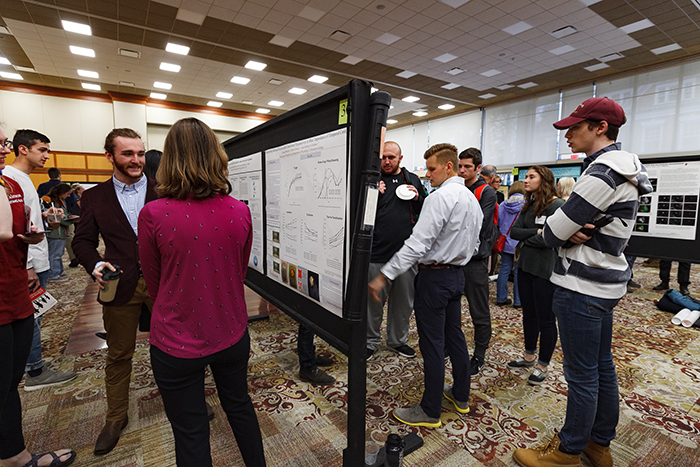Dickinson College Science Majors Share Research on 'Internet of Things,' Smoking Stigma and More

Kayla Simpson ’18 (biology) and Ilana Zeitzer ’19 (biology, studio art) present their research findings to students, faculty and staff. Amy Sparer ’18 (biology) also contributed to the group’s research, but is not pictured. Photos by Carl Socolow ’77.
Seniors showcase their projects at student research symposium
by Kandace Kohr
If you walked in to the HUB Social Hall on April 25, 2018, you couldn’t miss the large boards displaying complex scientific data or the students standing ready to explain their process, analysis and findings.
Dickinson students from all areas of the sciences presented individual and group research posters at the 33rd Annual Science Student Research Symposium. About 50 students presented a vast range of research that was conducted alongside a supporting faculty member; topics ranged from the extraction of green coffee to the consequences and stigma that smokers face.
Students were eager to present their results, representing a true culmination of many months of dedicated work, long hours and seemingly endless research. For Jake Beley ’18 (computer science), it’s been a year in the making to get him to this moment, and because of his work, he will graduate with departmental honors this May.
Mentored by Visiting Assistant Professor of Computer Science Farhan Siddiqui, Beley focused his research on data transference among smart objects to feed the "internet of things." Replicating the "internet of things" testing environment is about as difficult and tedious as cataloging each image or video file, he explains, but “having the opportunity to create an original testbed allowed me to fully understand everything I was implementing. One of the best parts of Dickinson is the faculty-student connections that the college encourages and fosters. These one-on-one opportunities allow Dickinson students to really be challenged on a variety of levels. It allowed me the chance to gain the skills that I would use if I pursue research at a graduate level.”

Similarly, Meghan Shippe ’18 (psychology, philosophy) hopes to continue studying clinical psychology, building on her research on the harmful effects of “fat talk” and its association with an increased risk for eating disorders. Her experiment observed the responses to fat talk and found that psychoeducation about feminist language could help circumvent the development of eating disorders.
After graduation, Shippe plans to continue working with her faculty mentor, Associate Professor of Psychology Suman Ambwani in the Clinical Assessment and Research Lab. Shippe is currently working on two research projects: an exploratory study on the nature of clean eating, how it is perceived by college students and its connection to disordered eating and a study examining the impact of media framing and social consensus on attitudes toward fat individuals and support for legislation targeting weight-based discrimination.
“These events give Dickinson students the opportunity to talk about/share/present their research in a safe and supportive environment," says Shippe, "and that is extremely important and something that is so special and unique to Dickinson.”
James Fisher '18 (earth sciences) was recognized for his research on the shortening of the Juniata culmination, for which he received the Poster of the Year award. Fisher received a number of awards throughout the course of his research, including Robert Allan Jansen Memorial Student-Faculty Research Fund grant, which is awarded to a team involving an earth sciences or environmental sciences/studies student. He presented his work alongside Kyle Fitch '18 (earth sciences) at The Geological Society of America's 2017 annual meeting in Seattle and at the Pennsylvania Council of Professional Geologists this year.
Learn more about student research presentations.
TAKE THE NEXT STEPS
Published May 16, 2018